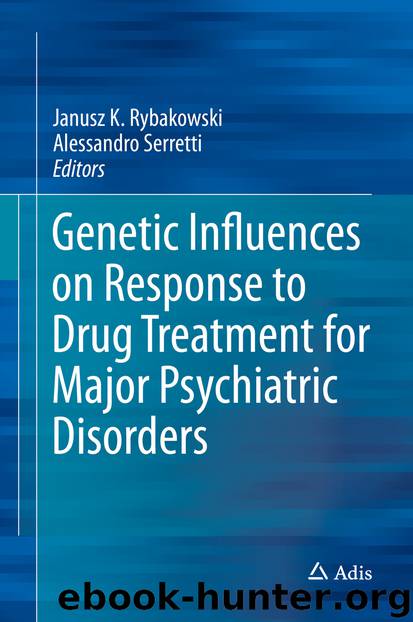Genetic Influences on Response to Drug Treatment for Major Psychiatric Disorders by Janusz K. Rybakowski & Alessandro Serretti

Author:Janusz K. Rybakowski & Alessandro Serretti
Language: eng
Format: epub
Publisher: Springer International Publishing, Cham
4.1 Background and Motivation
Around 1/3 of individuals who receive initial antidepressant treatment for major depressive disorder will not reach symptomatic remission. A subset of these, perhaps approaching 50 %, will not remit despite additional antidepressant treatment [31]. Such nonremission in the face of adequate antidepressant trials is referred to as treatment-resistant depression [9], a concept first characterized more than 40 years ago [15]. Both the retrospective assessment of antidepressant treatment history [24, 37] and the definition of treatment resistance itself have varied. In general, however, treatment-resistant depression is often taken to refer to the absence of remission following at least two adequate treatment trials in the current episode. (While past definitions often required two trials of medications of different classes, more recently even two SSRI failures may be considered TRD, on the basis of evidence from studies such as STAR*D suggesting similar probability of response to next-step treatment regardless of medication class [31].
The clinical rationale for studying treatment resistance relates to the consequences of more prolonged depression: a longer period of vulnerability to suicide, functional impairment, and poorer quality of life. Treatment-resistant depression makes a major contribution to the cost of depression as a whole: directly, by consuming more treatment resources and, indirectly, by increasing the cost of other comorbidities across medicine. For example, one claims study found medical costs 40 % greater among individuals with TRD [13].
Pharmacogenomics is often tied to personalized medicine, the effort to match individuals to treatment most effective for them. In the case of TRD, however, even stratified medicine – achieving more precise estimates of risk for multiple treatment failures, even where the specific effective treatment cannot yet be predicted – could have profound public health implications.
Download
This site does not store any files on its server. We only index and link to content provided by other sites. Please contact the content providers to delete copyright contents if any and email us, we'll remove relevant links or contents immediately.
Rewire Your Anxious Brain by Catherine M. Pittman(18625)
Talking to Strangers by Malcolm Gladwell(13334)
The Art of Thinking Clearly by Rolf Dobelli(10394)
Mindhunter: Inside the FBI's Elite Serial Crime Unit by John E. Douglas & Mark Olshaker(9302)
Becoming Supernatural by Dr. Joe Dispenza(8188)
Change Your Questions, Change Your Life by Marilee Adams(7721)
Nudge - Improving Decisions about Health, Wealth, and Happiness by Thaler Sunstein(7682)
The Road Less Traveled by M. Scott Peck(7576)
The Lost Art of Listening by Michael P. Nichols(7482)
Mastermind: How to Think Like Sherlock Holmes by Maria Konnikova(7306)
Enlightenment Now: The Case for Reason, Science, Humanism, and Progress by Steven Pinker(7292)
Win Bigly by Scott Adams(7176)
The Way of Zen by Alan W. Watts(6580)
Daring Greatly by Brene Brown(6492)
Big Magic: Creative Living Beyond Fear by Elizabeth Gilbert(5729)
Grit by Angela Duckworth(5580)
Ego Is the Enemy by Ryan Holiday(5395)
Men In Love by Nancy Friday(5219)
The Laws of Human Nature by Robert Greene(5139)
